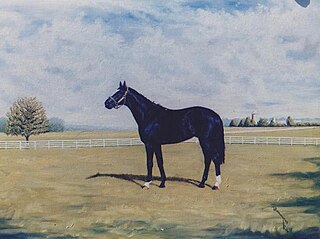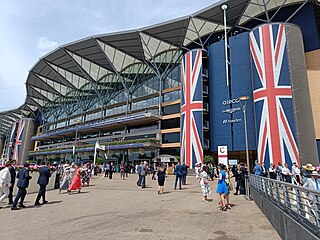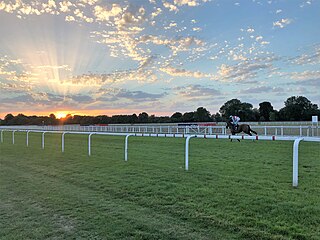
Horse racing is the second largest spectator sport in Great Britain, and one of the longest established, with a history dating back many centuries. According to a report by the British Horseracing Authority it generates £3.39 billion total direct and indirect expenditure in the British economy, of which £1.05 billion is from core racing industry expenditure, and the major horse racing events such as Royal Ascot and Cheltenham Festival are important dates in the British and international sporting and society calendar.
Ascot, Ascott or Askot may refer to:

The St James's Palace Stakes is a Group 1 flat horse race in Great Britain open to three-year-old colts. It is run at Ascot over a distance of 7 furlongs and 213 yards. It is scheduled to be run each year in June.

The Gold Cup is a Group 1 flat horse race in Great Britain open to horses aged four years or older. It is run at Ascot over a distance of 2 miles 3 furlongs and 210 yards, and it is scheduled to take place each year in June.

The Champion Stakes is a Group 1 flat horse race in Great Britain open to thoroughbreds aged three years or older. It is run at Ascot over a distance of 1 mile 1 furlong and 212 yards, and it is scheduled to take place as part of British Champions Day each year in October.

Ascot Racecourse is a dual-purpose British racecourse, located in Ascot, Berkshire, England, about 25 miles west of London. Ascot is used for thoroughbred horse racing, and it hosts 13 of Britain's 36 annual Flat Group 1 horse races and three Grade 1 Jumps races.

York Racecourse is a horse racing venue in York, North Yorkshire, England. It is the third biggest racecourse in Britain in terms of total prize money offered, and second behind Ascot in prize money offered per meeting. It attracts around 350,000 racegoers per year and stages three of the UK's 36 annual Group 1 races – the Juddmonte International Stakes, the Nunthorpe Stakes and the Yorkshire Oaks.

The social season, or season, refers to the traditional annual period in the spring and summer when it is customary for members of the social elite of British society to hold balls, dinner parties and charity events. Until the First World War, it was also the appropriate time to reside in the city rather than in the country in order to attend such events.

Newmarket Racecourse is a British Thoroughbred horse racing venue in Newmarket, Suffolk, comprising two individual racecourses: the Rowley Mile and the July Course. Newmarket is often referred to as the headquarters of British horseracing and is home to the largest cluster of training yards in the country and many key horse racing organisations, including Tattersalls, the National Horseracing Museum and the National Stud. Newmarket hosts two of the country's five Classic Races – the 1,000 Guineas and 2,000 Guineas, and numerous other Group races. In total, it hosts 9 of British racing's 36 annual Group 1 races.

Chester Racecourse, also known as the Roodee, is a racecourse located in Chester, England. The horse racing venue is officially recognised by Guinness World Records as the "oldest racecourse still in operation". Horse racing in Chester dates back to the early sixteenth century, with 1539 cited as the year racing began, although some sources give a date of 1512 for the first races in Chester. It is also thought to be the smallest racecourse of significance in England at 1 mile and 1 furlong (1.8 km) long.
The Albany Stakes is a Group 3 flat horse race in Great Britain open to two-year-old fillies. It is run at Ascot over a distance of 6 furlongs, and it is scheduled to take place each year in June.
The British Champions Fillies & Mares Stakes is a Group 1 flat horse race in Great Britain open to fillies and mares aged three years or older. It is run over a distance of 1 mile 3 furlongs and 211 yards (2,406 metres) as part of British Champions Day at Ascot in October.

Windsor Racecourse, also known as Royal Windsor Racecourse, is a thoroughbred horse racing venue located in Windsor, Berkshire, England. It is one of only two figure-of-eight courses in the United Kingdom, the other being at Fontwell Park.

John Harry Martin Gosden is a British racehorse trainer. He has trained over 3,000 winners worldwide, including victories in the Breeders' Cup Classic, the Derby, the Arc, the King George and the Eclipse. He’s won over 600 races in the United States.
Sagaro (1971–1986) was an Irish-bred, French-trained thoroughbred racehorse. He is regarded as one of the best stayers ever in Europe on the Flat.

Hayley Turner is an English jockey who competes in flat racing. Originally from Nottingham, she is based in Newmarket.
David Shilling is an English milliner, fashion designer, and interdisciplinary artist. Shilling is best known for his flamboyant hat and clothing designs worn on Ladies' Day at Royal Ascot. His clients include royalty, rock stars' wives, heads of state and notably, his mother Gertrude, who famously wore his creations while attending Ascot. Shilling's career encompasses all areas of art, fashion and jewellery design, sculpture, men's and women's bespoke clothing, home furnishings, theatre, ballet, opera and interior design. His art is in the collections of the Metropolitan Museum of Art, the Philadelphia Museum of Art, the Victoria and Albert Museum, the Louvre's Musee des Arts Decoratifs, and the British Government Art Collection.

Frankel is a retired champion British Thoroughbred racehorse and current sire. He was unbeaten in his fourteen-race career and was the highest-rated racehorse in the world from May 2011. He was trained by Henry Cecil in Newmarket and ridden in all his races by Tom Queally.
The Shergar Cup is an annual horse racing event held at Ascot Racecourse, usually during early August. The race is named in honour of Shergar, the horse that won the 1981 Derby and was killed in an IRA kidnap, and was originally sponsored by Shergar's owner, the Aga Khan. The event is currently sponsored by Dubai Duty Free.
The Sandringham Handicap is a flat handicap horse race in Great Britain open to three-year-old fillies. It is run at Ascot over a distance of 1 mile, and it is scheduled to take place each year in June on the fourth day of the Royal Ascot meeting. The race was called the Fern Hill Rated Stakes until 2001, and was part of the Ascot Heath meeting held on the Saturday after Royal Ascot. Prior to 2018 it was run as a Listed handicap but was downgraded by the British Horseracing Authority to comply with a new rule that no handicap race could carry Listed or Group race status.












